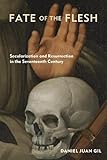Fate of the Flesh : Secularization and Resurrection in the Seventeenth Century / Daniel Juan Gil.
Material type: TextPublisher: New York, NY : Fordham University Press, [2021]Copyright date: ©2021Description: 1 online resource (256 p.)Content type:
TextPublisher: New York, NY : Fordham University Press, [2021]Copyright date: ©2021Description: 1 online resource (256 p.)Content type: - 9780823290079
- English poetry -- Early modern, 1500-1700 -- History and criticism
- Materialism in literature
- Religion and literature -- England -- History -- 17th century
- Resurrection in literature
- Literary Studies
- Religion
- Renaissance Studies
- LITERARY CRITICISM / Renaissance
- Avant-garde
- Donne, John
- Dualism
- Early Modern
- Herbert, George
- Jonson, Ben
- Materialism
- Metaphysical poetry
- Poetry
- Religion
- Renaissance
- Secular
- Secularization
- Seventeenth-Century
- Sexuality
- 821/.409382 23
- online - DeGruyter
| Item type | Current library | Call number | URL | Status | Notes | Barcode | |
|---|---|---|---|---|---|---|---|
 eBook
eBook
|
Biblioteca "Angelicum" Pont. Univ. S.Tommaso d'Aquino Nuvola online | online - DeGruyter (Browse shelf(Opens below)) | Online access | Not for loan (Accesso limitato) | Accesso per gli utenti autorizzati / Access for authorized users | (dgr)9780823290079 |
Browsing Biblioteca "Angelicum" Pont. Univ. S.Tommaso d'Aquino shelves, Shelving location: Nuvola online Close shelf browser (Hides shelf browser)

|

|

|

|

|

|

|
||
| online - DeGruyter Scatter 2 : Politics in Deconstruction / | online - DeGruyter Just Universities : Catholic Social Teaching Confronts Corporatized Higher Education / | online - DeGruyter Rationalist Empiricism : A Theory of Speculative Critique / | online - DeGruyter Fate of the Flesh : Secularization and Resurrection in the Seventeenth Century / | online - DeGruyter Toward a Feminist Ethics of Nonviolence / | online - DeGruyter Nothing Absolute : German Idealism and the Question of Political Theology / | online - DeGruyter The National Frame : Art and State Violence in Turkey and Germany / |
Frontmatter -- Contents -- Preface: Christianity as Critical Theory -- Introduction: Secularization and the Resurrection of the Flesh -- 1. Secularization, Countersecularization, and the Fate of the Flesh in Donne -- 2. Wanting to Be Another Person: Resurrection and Avant- Garde Poetics in George Herbert -- 3. Luminous Stuff: The Resurrection of the Flesh in Vaughan’s Religious Verse -- 4. The Feeling of Being a Body: Resurrection and Habitus in Vaughan’s Medical Writings -- 5. Resurrection, Dualism, and Legal Personhood: Bodily Presence in Ben Jonson -- Epilogue: Resurrection and Zombies -- Acknowledgments -- Notes -- Index
restricted access online access with authorization star
http://purl.org/coar/access_right/c_16ec
In the seventeenth century the ancient hope for the physical resurrection of the body and its flesh began an unexpected second life as critical theory, challenging the notion of an autonomous self and driving early modern avant-garde poetry. As an emerging empirical scientific world view and a rising Cartesian dualist ontology transformed the ancient hope for the resurrection of the flesh into the fantasy of a soul or mind living on separately from any body, literature complicated the terms of the debate. Such poets as Donne, Herbert, Vaughan, and Jonson picked up the discarded idea of the resurrection of the flesh and bent it from an apocalyptic future into the here and now to imagine the self already infused with the strange, vibrant materiality of the resurrection body.Fate of the Flesh explores what happens when seventeenth-century poets posit a resurrection body within the historical person. These poets see the resurrection body as the precondition for the social person’s identities and forms of agency and yet as deeply other to all such identities and agencies, an alien within the self that both enables and undercuts life as a social person. This perspective leads seventeenth-century poets to a compelling awareness of the unsettling materiality within the heart of the self and allows them to re-imagine agency, selfhood, and the natural world in its light. By developing a poetics that seeks a deranging materiality within the self, these poets anticipate twentieth-century “avant-garde” poetics. They frame their poems neither as simple representation nor as beautiful objects but as a form of social praxis that creates new communities of readers and writers assembled around a new experience of self-as-body mediated by poetry.
Mode of access: Internet via World Wide Web.
In English.
Description based on online resource; title from PDF title page (publisher's Web site, viewed 25. Jun 2024)


